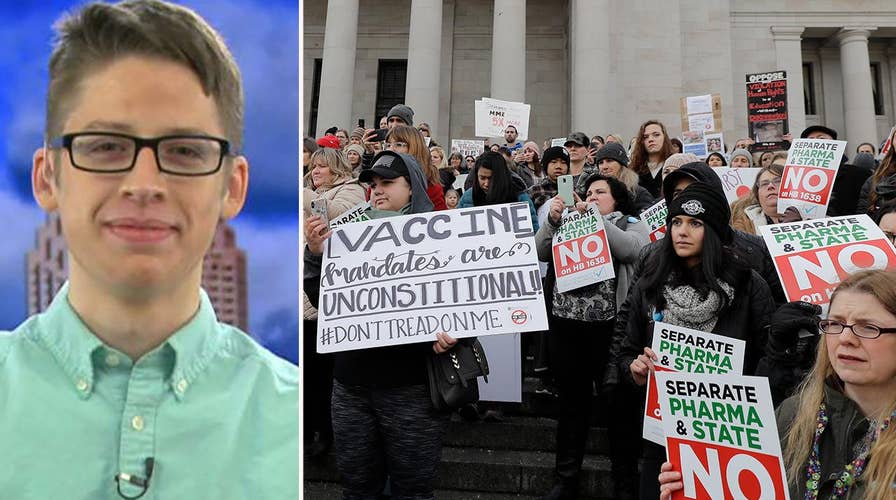Teen defies mother's wishes, gets vaccinated
Ethan Lindenberger gets first vaccine as Washington state struggles with a measles outbreak.
Weeks after a hotspot for anti-vaxxers turned into a hotspot for measles infections, vaccination rates have surged in the area, according to news reports.
Last month, following 50 confirmed cases and 11 suspected cases of the measles, Clark County, Washington, declared a public health emergency. Now, residents of the area are scrambling for vaccinations, according to Kaiser Health News.
HEALTH OFFICIALS IN TEXAS CONFIRM AT LEAST 5 CASES OF MEASLES
Compared with January of last year, measles vaccinations in Clark County are up 500 percent, from 530 doses to 3,150 doses. Statewide, the number of measles vaccinations increased by about 30 percent, from 12,140 doses last January to 15,780 this January, Kaiser Health News reported. [27 Devastating Infectious Diseases]
The measles virus is extremely contagious but is also considered "extremely rare," because it's easily preventable with vaccines. But an increase in anti-vaccination movements across the country and even in other parts of the world has left children unprotected and vulnerable to the infection.
The outbreak in Washington state is one of three current measles outbreaks in the U.S. There are also outbreaks in New York City and New York state.
NORTHWEST MEASLES OUTBREAK PROMPTS LOOK AT VACCINE EXEMPTIONS
The MMR vaccine protects against three different viruses: measles, mumps and rubella. (There's also a different form of the vaccine, called the MMRV vaccine, that protects against those three diseases plus varicella, which is the virus that causes chickenpox.)
Children should be given two doses of the MMR vaccine. The first should be administered when the child is from 12 to 15 months of age and the second when the child is from 4 to 6 years of age, according to the Centers for Disease Control and Prevention. If a child receives one dose of the vaccine, he or she is protected from the infection 93 percent of the time. With two doses, a child is protected 97 percent of the time, according to the CDC. Adults who haven't been vaccinated should get at least one dose of the MMR vaccine, according to the CDC.
CLICK HERE TO GET THE FOX NEWS APP
Once the vaccine is administered, it takes about 72 hours to confer protection.
Tiny & Nasty: Images of Things That Make Us Sick
10 Deadly Diseases That Hopped Across Species
Originally published on Live Science.
